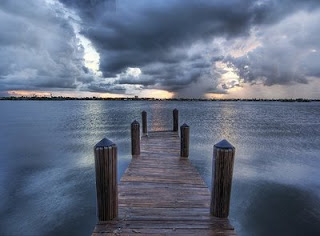It’s never easy to stand when the storm hits. As soon as it starts
raining, lightning shortly follows. Dark clouds replace the sun and all
you can see are the waves of an ocean, once calm, surrounding you. No
longer able to find your way, you reach out for help.
You begin by calling the coast guard. No reply. You try again to
redirect the boat. No use. You look for the lifeboat. It’s gone. You
reach for a life jacket. Torn. Finally after you’ve exhausted every
means, you turn your face upward.
And ask God.
But there’s something completely unique about this moment. At this
instant, you experience something you otherwise could only theorize
about: true tawheed. Oneness. See, on shore, you may have
called on God. But you called on Him along with so many others. You may
have depended on God. But you depended on Him along with so many other
handholds. But for this singular moment, everything else is closed.
Everything. There is nothing left to call on. Nothing left to depend on.
But Him.
And that’s the point.
Do you ever wonder why when you’re most in need, every door you seek
of the creation remains closed? You knock on one, but it’s slammed shut.
So you go to another. It’s also shut. You go from door to door,
knocking, pounding on each one, but nothing opens. And even those doors
you had once depended on, suddenly shut. Why? Why does that happen?
See, we humans have certain qualities which God knows well. We are
constantly in a state of need. We are weak. But, we are also hasty and
impatient. When we are in trouble, we will be pushed to seek assistance.
And that’s the design. Why would we seek shelter if it’s sunny and the
weather is nice? When does one seek refuge? It is when the storm hits.
So Allah subahanahu wa ta`ala (exlated is He) sends the storm; He makes the need through a created situation, so that we will be driven to seek shelter.
But when we do seek assistance, because of our impatience, we seek it
in what is near and what seems easy. We seek it in what we can see and
hear and touch. We look for shortcuts. We seek help in the creation,
including our own selves. We look for help in what seems closest. And
isn’t that exactly what dunya (wordly life) is? What seems near. The word ‘dunya’ itself means ‘that which is lower’. Dunya is what seems closest. But, this is only an illusion.
There is something closer.
Think for a moment about what’s nearest to us. If asked this
question, many would say it is the heart and the self that are nearest.
But, Allah (swt) says:
“It was We Who created man, and We know what dark suggestions his nafs (self) makes to him: for We are nearer to him than (his) jugular vein,” (Qur’an 50:16).
In this verse, Allah (swt) begins by showing us that He knows our
struggles. There is comfort in knowing that someone sees our struggles.
He knows what our own self calls us to. But He is closer. He is closer
than our own self and what it calls for. He is closer than our jugular
vein. And why the jugular? What is striking about this part of us? The
jugular vein is the most important vein that brings blood to the heart.
If severed, we die almost immediately. It is literally our lifeline. But
Allah (swt) is closer. Allah (swt) is closer than our own life, than
our own Self, than our own nafs. And He is closer than the most important pathway to our heart.
In another verse, Allah (swt) says:
Allah (swt) knows we have a nafs. Allah knows we have a
heart. Allah knows that these things drive us. But Allah tells us that
He is closer to us than even these. So when we reach for other than Him,
we are not only reaching for what is weaker, we are also reaching past
what is closer, for what is further and more distant. Subhan Allah (Glory be to God).
So since this is our nature, as Allah (swt) knows best, He protects
and redirects us by keeping all other doors of refuge closed during the
storm. He knows that behind each false door is a drop. And if we enter
it, we will fall. In His mercy, He keeps those false doors closed.
In His mercy, He sent the storm itself to make us seek Him. And then
knowing that we’re likely to get the wrong answer, He gives us a
multiple choice exam with only one option to choose from: the correct
answer. The hardship itself is ease. By taking away all other
handholds, all other multiple choice options, He has made the test
simple.
It’s never easy to stand when the storm hits. And that’s exactly the
point. By sending the wind, He brings us to our knees: the perfect
position to pray.

Comments
Post a Comment
Although every comment is appreciated, due to time limitations I might not be able to respond to every one. Comments are moderated and may take some time to appear. All spam comments will be deleted.